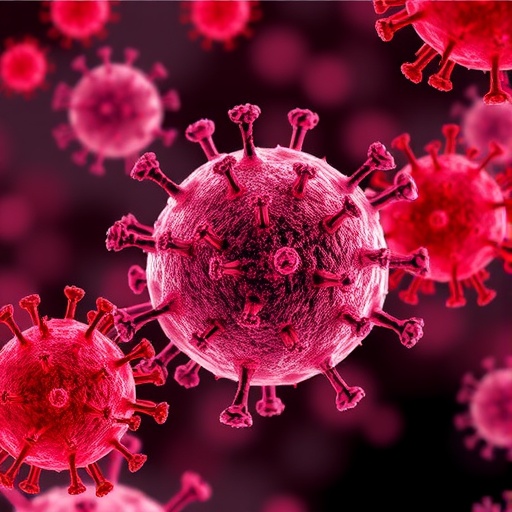In a groundbreaking study published in Nature Communications, researchers have unveiled a critical molecular mechanism linking the Hippo signaling pathway effector YAP (Yes-associated protein) to enterovirus replication within the context of type 1 diabetes (T1D). This discovery not only deepens the understanding of viral pathogenesis in autoimmune conditions but also presents novel therapeutic targets that may reshape future interventions for virus-mediated complications in T1D patients. The comprehensive research spearheaded by Geravandi, Liu, and Pahwa et al. uncovers how YAP modulation can create an environment conducive to enteroviral proliferation, potentially exacerbating disease progression.
Type 1 diabetes is characterized by autoimmune destruction of pancreatic beta cells, leading to insulin deficiency and chronic metabolic dysregulation. The role of viral infections, particularly enteroviruses, in triggering or aggravating autoimmune responses has been a contentious yet increasingly studied area. Enteroviruses, a genus including coxsackieviruses, are known to infect the pancreas and have been proposed as environmental triggers in genetically susceptible individuals. However, the molecular underpinnings that facilitate viral replication and persistence within the diabetic milieu remained elusive until now.
Central to this study is the Hippo signaling pathway, a crucial regulator of organ size, cell proliferation, and apoptosis. YAP, the terminal effector of this pathway, acts as a transcriptional coactivator influencing genes involved in cellular growth and survival. Prior research has established YAP’s role in oncogenesis and tissue regeneration, but its intersection with viral replication mechanisms had not been elucidated in the context of autoimmune diseases. The new findings position YAP not only as a bystander but an active enhancer of enterovirus replication in pancreatic cells affected by type 1 diabetes.
The researchers employed a range of molecular biology techniques, including gene knockout models, RNA interference, and viral quantification assays to dissect the interplay between YAP activity and viral replication. Through these approaches, they demonstrated that elevated YAP activity, commonly observed in pancreatic tissues of T1D patients, significantly amplifies enteroviral genome replication and viral particle assembly. This suggests that YAP’s transcriptional activity can be hijacked by enteroviruses to bolster their life cycle within host cells.
Mechanistic insights revealed that YAP directly influences the expression of host factors essential for enterovirus replication complexes. By promoting the transcription of these genes, YAP creates an intracellular environment optimized for viral RNA synthesis and capsid formation. Furthermore, the study discovered that YAP modulates the autophagic pathways, which are often exploited by enteroviruses to facilitate virion release and evade immune detection. This dual functionality amplifies viral productivity while dampening host antiviral responses.
In addition to in vitro cell culture systems, in vivo models recapitulating type 1 diabetes pathophysiology were employed to validate the relevance of YAP-mediated enhancement of enterovirus replication. These models confirmed that suppression of YAP activity leads to a marked reduction in viral loads, alleviating pancreatic inflammation and preserving beta cell mass. The translational potential of these findings was underscored by pharmacological inhibition studies showing that YAP antagonists could mitigate viral replication and associated tissue damage.
An intriguing aspect of the research is the bidirectional relationship between viral infection and YAP signaling. Not only does YAP promote viral replication, but enteroviral infection itself seems to trigger upstream components of the Hippo pathway, leading to altered YAP localization and activity. This feedback loop may perpetuate chronic infection and exacerbate autoimmune destruction, providing a molecular explanation for the sustained inflammatory processes in T1D.
The clinical implications of these discoveries are profound. Understanding YAP as a facilitator of viral replication in diabetes suggests that targeting this pathway could form the basis of innovative antiviral therapies that complement current immunomodulatory strategies. Moreover, biomarkers derived from YAP activity levels could enable earlier detection of enteroviral involvement in diabetes onset or progression, refining patient stratification and personalized treatment approaches.
The study also opens avenues for examining YAP’s role in other viral infections and autoimmune diseases where dysregulated cell growth pathways intersect with pathogen replication. Given YAP’s centrality in diverse biological processes, its manipulation must be approached with precision to balance antiviral efficacy and preservation of tissue homeostasis. The interplay between transcriptional regulation, viral lifecycle facilitation, and immune modulation presents a sophisticated network ripe for targeted intervention.
Future research directions as indicated by the authors include the exploration of YAP inhibitors in clinical trials focusing on T1D patients with active or recurrent enteroviral infections. Additionally, elucidating the structural domains of YAP responsible for interaction with viral or host proteins could refine drug design. The potential for combination therapies integrating YAP modulation with antiviral agents or beta cell protective strategies heralds a new epoch in managing virus-associated diabetes.
This pioneering work by Geravandi, Liu, and Pahwa et al. underscores the intricate molecular crosstalk that defines host-pathogen relationships within complex chronic diseases like type 1 diabetes. By spotlighting the Hippo pathway terminal effector YAP as a viral replication booster, the research bridges virology, immunology, and endocrinology, advancing the frontiers of biomedical science and offering hope for transformative therapeutic paradigms.
Subject of Research:
The role of the Hippo pathway terminal effector YAP in enhancing enterovirus replication within the context of type 1 diabetes.
Article Title:
The Hippo terminal effector YAP boosts enterovirus replication in type 1 diabetes.
Article References:
Geravandi, S., Liu, H., Pahwa, H. et al. The Hippo terminal effector YAP boosts enterovirus replication in type 1 diabetes. Nat Commun 16, 8882 (2025). https://doi.org/10.1038/s41467-025-64508-6
Image Credits: AI Generated




